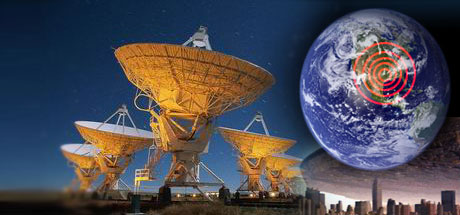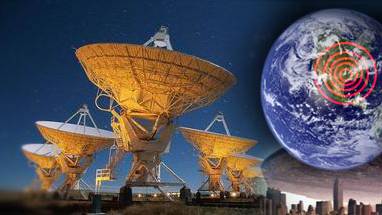Don’t call the aliens,they might not be friendly
Source: timesonline.co.uk

For decades it has been a staple of science fiction � somewhere out in the galaxy, a highly developed alien race picks up a radio signal from Earth, and decides to eat us for lunch.
In a world plagued by war, hunger and disease, a possible attack by little green men may not rank high among most nations’ concerns. Yet for a small group of scientists who are harnessing increasingly powerful technologies in a trans-galactic search for signs of extraterrestrial intelligence, the prospect of catastrophe has stirred an angry debate.
Two senior scientists have resigned from an elite international study group in protest over a lack of public discussion about the possible consequences of attracting the attention of aliens by sending signals deep into space.
“We’re talking about initiating communication with other civilisations, but we know nothing of their goals, capabilities or intent,” warned John Billingham, a former Nasa scientist who has quit an extraterrestrial study group set up by the International Academy of Astronautics (IAA).
The scientists involved are all acutely aware of the dangers of ridicule in their discussions of ET and his more sinister cousins. Yet recent advances in radio telescope technologies, and a substantial flow of private funding into ET-related projects, has transformed the “search for extraterrestrial intelligence” (Seti).
In California last October, astronomers switched on the first elements of a giant new array of radio telescopes that will vastly extend the sweep of signals into outer space. Known as the Allen Telescope Array, it was built with the help of a $25m (£12.3m) donation from Paul Allen, the billionaire co-founder of Microsoft, and is a joint project of the Radio Astronomy Laboratory of the University of California at Berkeley, and the Seti Institute, America’s foremost centre of ET research.
“I like to call Seti the longest of long shots,” Allen said when the telescopes were commissioned. “But if this array picks up a signal, that would be an amazing thing � a civilisation-changing event.”
Yet critics argue that listening for signals and actively seeking out alien life are very different pursuits. At the Russian Academy of Sciences in Moscow, Alexander Zaitsev, chief scientist at the Institute of Radio Engineering and Electronics, has been using a 70-metre-wide radio telescope in the Crimea to beam signals to nearby star systems � a practice known as “active Seti”.
It is the steady shift from listening to transmitting that has divided the Seti community and raised awkward questions that no one has yet been able to answer. Who will speak for Earth if an alien civilisation replies? And are we really in danger of inviting Armageddon? Sir Bernard Lovell, the British founder of Jodrell Bank, once remarked that it was a “dangerous assumption” that any alien life would turn out to be friendly.
If an alien fleet mobilises against us, Allen should be one of the first to know. “If they do find something, they’re going to call me up and say we have a signal,” he said. “So far the phone hasn’t rung.”
Yet the question of whether we should go actively looking for ETs still needs to be debated, insists Michael Michaud, a former US State Department official who has also resigned from the IAA study group. Michaud is alarmed by his colleagues’ reluctance to halt transmissions pending consideration of the possible consequences.
Article from: http://www.timesonline.co.uk/tol/news/
world/us_and_americas/article3056423.ece






















